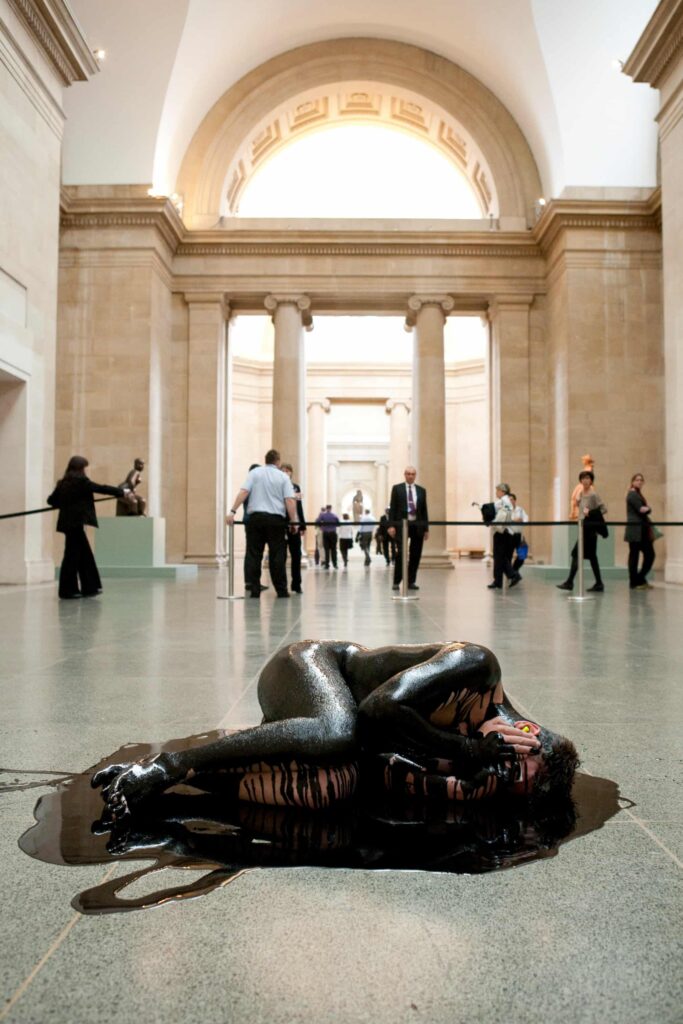Liberate Tate
Liberate Tate was established in January 2010 after a workshop on art and activism, ironically commissioned by the Tate Modern. At the workshop, the museum made forceful efforts to censor conversations regarding the Tate’s shameful relationship with BP, a massive fossil fuel company responsible for significant environmental detriment around the world, including its devastating oil spill in the same year, 2010, as well as its larger part in the proliferation of global climate change. The participants at the workshop objected to the institution’s attempt to censor discussions about its controversial corporate sponsors, spurring them to form a group dedicated to pressuring Tate to end this partnership and to spread awareness of this sort of hypocrisy at the institutional level within the art world.
To convey their message, the collective staged unauthorized, site-specific performances within Tate galleries, blending art and activism to provoke public discourse and publicly pressure the institution in their own physical estate in London. The disruptive artistic strategy of Liberate Tate’s activist campaign rendered the issue of climate change and its capitalist-funding causes unavoidable for the museum’s visitors, putting pressure on the institution to end its ties to BP and other fossil fuel “giants.” Moreover, the highly visible and public nature of the group’s well-orchestrated stunts inside the museum (including a staged oil spill, the release of hundreds of black helium balloons attached to dead fish and birds, and the “offering” of a 1.5-tonne wind turbine blade to the museum’s collection) encouraged discourse on the wider influence of harmful funding streams and philanthropy in the fine arts.
The group was ultimately successful when, in 2017, the Tate ended its sponsorship with BP. Today, Liberate Tate continues to advocate for the liberation of the arts from ties to fossil fuel companies (at the institutional scale) by using civil disobedience strategies— or as they call it, “creative disobedience”— to generate as much press coverage and public uproar as possible. Liberate Tate’s methods disrupt the typically peaceful, business-as-usual model that large-scale museums foster, putting harmful corporate ties, which privately bolster these so-called “public” institutions behind the scenes, at the forefront of the fine arts conversation.

City
Country
Region
Year of Creation
Featured Project

Resources
Booth, Ellen. “Liberate Tate: the quiet sounds of art activism.” openDemocracy, 19 Jun. 2015, https://www.opendemocracy.net/en/opendemocracyuk/liberate-tate-quiet-sounds-of-art-activism/.
Evans, Mel. “How Activists Made the Art World Wake Up to the Climate Crisis.” FRIEZE, 11 Feb. 2020, https://www.frieze.com/article/how-activists-made-art-world-wake-climate-crisis.
Larsson, Naomi. “Oil stains a cultural institution in Britain, but artists are fighting back.” 1 Dec. 2023, https://www.oneearth.org/oil-stains-a-cultural-institution-in-britain-but-artists-are-fighting-back/.
“Liberate Tate’s six-year campaign to end BP’s art gallery sponsorship – in pictures.” The Guardian, 19 Mar. 2016, https://www.theguardian.com/environment/gallery/2016/mar/19/liberate-tates-six-year-campaign-to-end-bps-art-gallery-sponsorship-in-pictures.
Muñoz-Alonso, Lorena. “Climate Activists Occupy Tate Modern in Dramatic Protest over BP Sponsorship of the Arts.” Artnet, 15 Jun. 2015, https://news.artnet.com/art-world/climate-activists-occupy-tate-modern-bp-sponsorship-308006.
“Tate reveals BP sponsorship figures.” BBC, 27 Jan. 2015, https://www.bbc.com/news/entertainment-arts-30999722.
Interviews & Lectures:
“Hayley Newman talks about Liberate Tate and her practice.” Uploaded by this is tomorrow to YouTube, 26 Apr. 2015, https://www.youtube.com/watch?v=6RvaRP4V7TQ.
Savage, Sara. “Activist art collective Liberate Tate’s ‘creative disobedience’.” AssemblePapers, 20 Mar. 2017, https://assemblepapers.com.au/2017/03/20/culture-capital-liberate-tate/.
Vartanian, Hrag. “Why Liberate Tate Joined the #WhitneyPipeline Protests.” Hyperallergic, 16 Apr. 2015, https://hyperallergic.com/199678/why-liberate-tate-joined-the-whitneypipeline-protests/.
“Visualising the End of the Oil Age – Liberate Tate.” Uploaded by Liberate Tate to YouTube, 1 Apr. 2016, https://youtu.be/4eJs0mjT844?si=jASxq-1kzfi-iw2v.
Press Releases:
“Liberate Tate with The Guerrilla Girls calls on Tate to go ‘Fossil Funds Free’ (in association with Platform London).” Liberate Tate, Oil Sponsorship Free, 8 Oct. 2016, http://oilsponsorshipfree.org/guerilla-girls-liberate-tate/.
“New BP Spotlight Displays at Tate Britain.” The Board of Trustees of the Tate Gallery, 27 Jun. 2016, https://www.tate.org.uk/press/press-releases/new-bp-spotlight-displays-tate-britain.
Reed, Stanley. “BP to End Sponsorship of Tate Museums.” The New York Times, 11 Mar. 2016, https://www.nytimes.com/2016/03/12/business/energy-environment/bp-to-end-sponsorship-of-tate-museums.html.
More Information
IMPORTANT: Profile pages for all collectives are in permanent development and have been built using information in the public domain. They will be updated progressively and in dialogue with the organizations by the end of 2024. New features and sections will be included in 2025, like featured videos, and additional featured projects. Please contact us if you discover errors. For more information on mapping criteria and to submit your organization’s information to be potentially included in the database, visit this page

